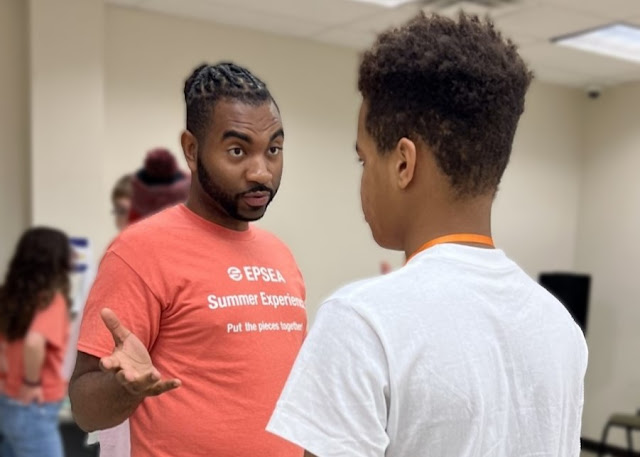Making the Grade, FCCS Partnership Keeps Teens in School, on Track to Graduation
With tutoring and educational supports specifically designed to help young people in a foster or kinship situation - and for youth simply connected to the child welfare system because of struggles with their parents - Franklin County Children Services is helping to prevent young learners from missing school or sliding in grades during transitions in their home placement.
Called the Educational Partnership for Social Emotional and Academics (EPSEA), FCCS works with the Education Service Center of Central Ohio to provide hands-on counseling and resources to children and teenagers in the agency’s care.
And with a priority from FCCS on protecting the “whole” child - body, mind, and heart - this partnership on education is reversing past trends that show how foster youth typically struggle with school and often fail to reach graduation due to the social and emotional needs they often have, said Erica James, the EPSEA coordinator.
“EPSEA provided a real shift of focus on the social, emotional, and skill development.”
Last year, EPSEA coordinators and liaisons provided one-on-one educational support to 449 students in FCCS custody, with nearly 700 consults on enrollment, attendance, social-emotional, classroom, and special education needs.
Because the youth served by FCCS might be placed in homes across the county and throughout the state, the 17 EPSEA school liaisons coordinated with 34 local school districts and more than 183 schools.
“Schools are doing their very best. FCCS is interested in serving the whole child, and this educational support is a value added to the lifelong experience of our youth people. It builds resiliency, which is a trait that can be used” in adulthood and secondary education pursuits, Ms. James said.
It must be working. Teens connected to the program have achieved a 94% graduation rate, 30 points higher than the national average.
And only 6% of the EPSEA youth failed to advance to the next grade level last year. Nationwide, it’s typically 33% of youth in care who are retained for an extra year in their current class.
An Intake Educational Supports Coordinator is often assigned cases during the FCCS Intake phase and in the FCCS Crisis Center, the agency’s front door.
Caseworkers and EPSEA liaisons meet monthly to discuss the needs students might have, as part of a meeting dubbed “Champions of Education,” said Tanina Seagraves, an FCCS supervisor who serves as the link between the agency and EPSEA staff. She also regularly meets with school district leaders and caseworkers to manage access to services.
Columbus City Schools is the biggest district EPSEA and FCCS work with.
“We have regular meetings with Columbus City Schools to strategize the challenges we have on both sides,” said Dr. Jessica Foster, associate director of the agency’s Research and Educational Supports Department. “We’ve all had to adjust some since COVID-19 when our numbers were low.”
EPSEA liaisons helped 100 more students last year than in 2022. They held more than 3,000 meetings with youth and school officials in that same time to build relationships that would help the student reach their monthly goals around academics, attendance, and behavior improvements.
EPSEA staff members have also held four successful Summer training camps for high school teens to keep them motivated and on target.
And just launched this year, a new pilot tracking system for students in 8th grade and beyond will help monitor whether students remain on track to graduation.
“Without this partnership, we believe you would see a deterioration of academic success and a lack of social-emotional support that today’s students need so much,” James said. “FCCS is definitely making the grade.”




Comments
Post a Comment